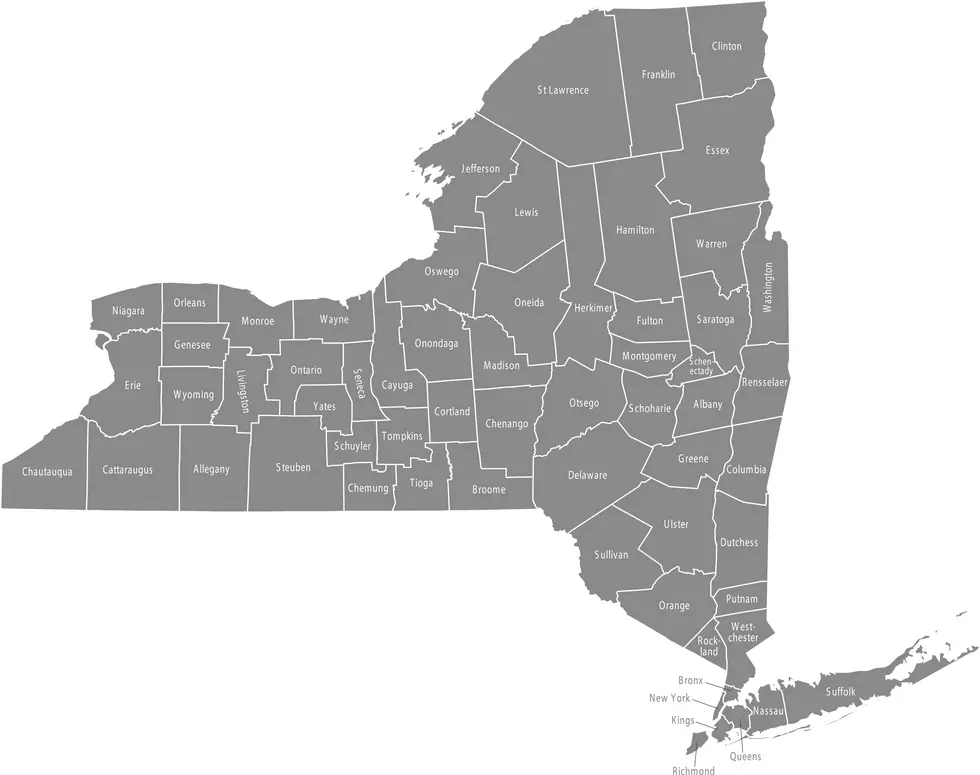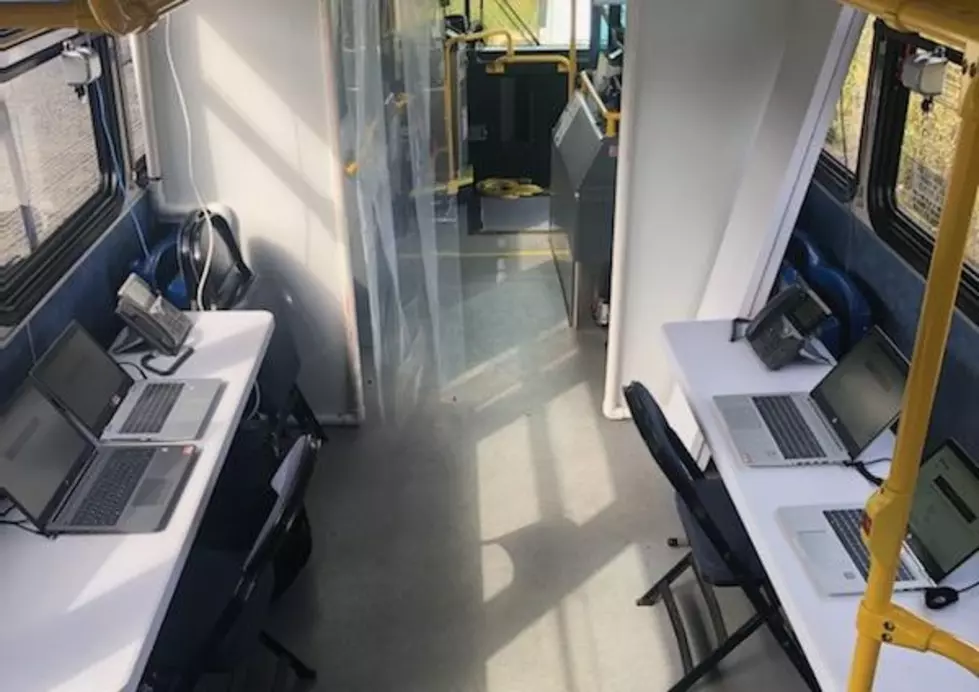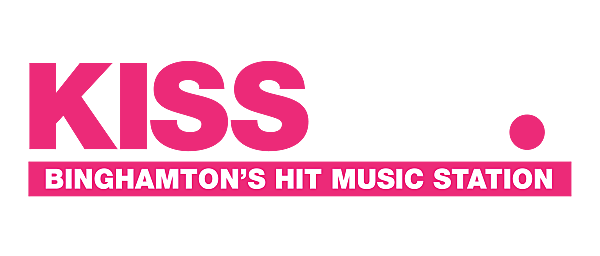
New York Considers These Businesses ‘Essential Businesses’
State officials updated what is considered an "essential business" as non-essential businesses are being shut down again across New York State.
On Sunday, Gov. Andrew Cuomo announced the state would start taking "aggressive enforcement" on the top-20 hot spot ZIP codes, which includes parts of Orange and Rockland counties.
On Tuesday, Cuomo revealed "The Cluster Action Initiative." The initiative is composed of three steps:
1)Take dramatic action within the cluster.
2) Take action in the area surrounding the cluster to stop the spread.
3) Take precautionary action in the outlying communities.
Cuomo announced the state is creating three different zones; red, yellow and orange. Red is considered a cluster, orange is a buffer zone from the cluster and yellow is a precautionary area from the cluster. Cuomo says clusters are being declared in parts Orange and Rockland Counties as well as Brooklyn, and Queens. All non-essential businesses must close in areas that are in the red zone.
The Empire State Development recently updated its list of what is an “Essential Business." Below is what New York State now considers an "Essential Business," according to the Empire State Development:
1. Essential health care operations including
- research and laboratory services
- hospitals
- walk-in-care health clinics and facilities
- veterinary and livestock medical services
- senior/elder care
- medical wholesale and distribution
- home health care workers or aides for the elderly
- doctors and doctors’ offices
- dentists and dental practices
- nursing homes, residential health care facilities, or congregate care facilities
- medical supplies and equipment manufacturers and providers
- licensed mental health providers
- licensed substance abuse treatment providers
- medical billing support personnel
- speech pathologists and speech therapy
- chiropractic services
- acupuncture
- physical therapy
- occupational therapy
2. Essential infrastructure including
- public and private utilities including but not limited to power generation, fuel supply, and transmission
- public water and wastewater
- telecommunications and data centers
- airlines/airports
- commercial shipping vessels/ports and seaports
- transportation infrastructure such as bus, rail, for-hire vehicles, garages
- hotels, and other places of accommodation, including campgrounds. Campgrounds must take precautions to ensure campers maintain appropriate social distancing and adhere to proper cleaning and disinfecting protocols, including but not limited to maintaining six feet of distance between campers, unless wearing an acceptable face covering, excluding persons from the same household who are camping together.
3. Essential manufacturing including
- food processing, manufacturing agents including all foods and beverages
- chemicals
- medical equipment/instruments
- pharmaceuticals
- sanitary products including personal care products regulated by the Food and Drug Administration (FDA)
- telecommunications
- microelectronics/semi-conductor
- food-producing agriculture/farms
- household paper products
- defense industry and the transportation infrastructure
- automobiles
- any parts or components necessary for essential products that are referenced within this guidance
4. Essential retail including
- grocery stores including all food and beverage stores
- pharmacies
- convenience stores
- farmer’s markets
- gas stations
- restaurants/bars (but only for take-out/delivery)
- hardware, appliance, and building material stores
- pet food
- telecommunications to service existing customers and accounts
- in regions that are not yet within the first phase of the state's regional reopening plan, delivery for orders placed remotely via phone or online at non-essential retail establishments; provided, however, that only one employee is physically present at the business location to fulfill orders
5. Essential services including
- 2020 Census operations and activities
- trash and recycling collection, processing, and disposal
- mail and shipping services
- laundromats and other clothing/fabric cleaning services
- building cleaning and maintenance
- child care services
- bicycle repair
- auto repair and maintenance
- automotive sales conducted remotely or electronically, with in-person vehicle showing, return, and delivery by appointment only
- warehouse/distribution and fulfillment
- funeral homes, crematoriums and cemeteries
- storage for essential businesses
- maintenance for the infrastructure of the facility or to maintain or safeguard materials or products therein
- animal shelters and animal care including dog walking, animal boarding and pet grooming but only to the extent necessary to ensure animal health
- landscaping, gardening and horticulture
- designing, printing, publishing and signage companies to the extent that they support essential businesses or services
- remote instruction or streaming of classes from public or private schools or health/fitness centers; provided, however, that no in-person congregate classes are permitted
6. News media
7. Financial Institutions including
- banks or lending institution
- insurance
- payroll
- accounting
- services related to financial markets, except debt collection
8. Providers of basic necessities to economically disadvantaged populations including
- homeless shelters and congregate care facilities
- food banks
- human services providers whose function includes the direct care of patients in state-licensed or funded voluntary programs; the care, protection, custody and oversight of individuals both in the community and in state-licensed residential facilities; those operating community shelters and other critical human services agencies providing direct care or support
9. Construction
Essential construction includes:
- construction for, or your business provides necessary support for construction projects involving, roads, bridges, transit facilities, utilities, hospitals or healthcare facilities, homeless shelters, or public or private schools;
- construction for affordable housing, as defined as construction work where either (i) a minimum of 20% of the residential units are or will be deemed affordable and are or will be subject to a regulatory agreement and/or a declaration from a local, state, or federal government agency or (ii) where the project is being undertaken by, or on behalf of, a public housing authority;
- construction necessary to protect the health and safety of occupants of a structure;
- construction necessary to continue a project if allowing the project to remain undone would be unsafe, provided that the construction must be shut down when it is safe to do so;
- construction for existing (i.e. currently underway) projects of an essential business; or
- construction work that is being completed by a single worker who is the sole employee/worker on the job site.
10. Defense
- defense and national security-related operations supporting the U.S. Government or a contractor to the US government
11. Essential services necessary to maintain the safety, sanitation and essential operations of residences or other businesses including
- law enforcement, including corrections and community supervision
- fire prevention and response
- building code enforcement
- security
- emergency management and response, EMS and 911 dispatch
- building cleaners or janitors
- general and specialized maintenance whether employed by the entity directly or a vendor, including but not limited to heating, ventilation, and air conditioning (HVAC) and pool maintenance
- automotive repair
- cleaning, disinfection, and sanitation services
- occupational safety and health professionals
- residential and commercial moving services
12. Vendors that provide essential services or products, including logistics and technology support, child care and services including but not limited to:
- logistics
- technology support for online services
- child care programs and services
- government owned or leased buildings
- essential government services
- any personnel necessary for online or distance learning or classes delivered via remote means
13. Recreation
- Parks and other open public spaces, including playgrounds and other areas of congregation within the discretion of the state or local government so long as appropriate social distancing of at least six feet among individuals can be abided, acceptable face coverings are worn by individuals who are over the age of two and able to medically tolerate such coverings, and frequent cleaning/disinfection measures are in place for hard surfaces and objects frequently touched by multiple people (e.g., handrails, benches)
- Outdoor, low-risk recreational activities are permitted so long as social distancing and cleaning/disinfecting measures are in place:
- tennis;
- non-motorized boat use and rentals, such as row boats, kayaks, canoes;
- golf and driving ranges, except miniature (mini) golf, with food and retail services subject to the restrictions that are currently in effect within the region;
- racket games, such as badminton, pickleball, racquetball;
- toss/bowl games, such horseshoes, bocce, bean bag toss, croquet;
- flying disc games, such as disc golf and frisbee;
- shuffleboard;
- aerial rope courses or zip lining;
- rope courses including aerial rope courses;
- batting cages;
- shooting ranges; and
- swim classes and swim instruction.
- Drive-in movie theaters so long as social distancing and cleaning/disinfecting measures are in place
- Marinas, boatyards, and recreational marine manufacturers, for ongoing marina operations and boat repair/maintenance, where such facilities adhere to strict social distancing and sanitization protocols. In regions that are not within the first phase of the state's regional reopening plan, use of such sites for the purposes of personal use or operation of boats or other watercraft is permissible, provided that no establishment offer chartered motorized watercraft services or motorized boat rentals. Restaurant activity at such sites are limited to take-out or delivery only.
14. Professional services with extensive restrictions
- Lawyers may continue to perform all work necessary for any service so long as it is performed remotely. Any in-person work presence shall be limited to work only in support of essential businesses or services; however, even work in support of an essential business or service should be conducted as remotely as possible.
- Real estate services shall be conducted remotely for all transactions, including but not limited to title searches, appraisals, permitting, inspections, and the recordation, legal, financial and other services necessary to complete a transfer of real property; provided, however, that any services and parts therein may be conducted in-person only to the extent legally necessary and in accordance with appropriate social distancing and cleaning/disinfecting protocols; and nothing within this provision should be construed to allow brokerage and branch offices to remain open to the general public (i.e. not clients).
If you have reviewed this guidance and require additional assistance in determining whether or not your business is permitted to operate on-site, you may consult the New York Forward Business Reopening Lookup Tool here.
These Parts of New York Are Shutting Down Over New COVID-19 Rules
More From KISS 104.1








![BC Parks Scarecrows on Display [GALLERY]](http://townsquare.media/site/499/files/2020/10/IMG_5366.jpg?w=980&q=75)
